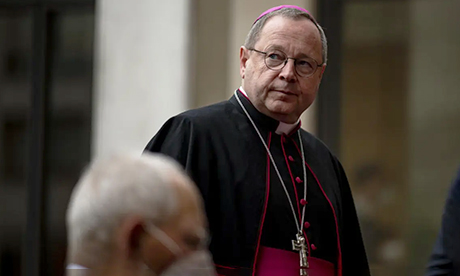German bishops have hit back against a Vatican warning over the direction of the Synodal Way, saying they were “astonished” by the rebuke.
The Vatican said Germany’s synodal path is a threat to church unity at a universal level. The Holy See stressed that the undertaking lacks the authority to compel bishops to make changes on doctrine and morality.
“In order to protect the freedom of the People of God and the exercise of episcopal ministry, it seems necessary to specify that the ‘Synodal Way’ in Germany has no power to oblige the bishops and the faithful to adopt new ways of governing and new approaches to doctrine and morals,” the Vatican said in an unsigned July 21 statement.
“It would not be lawful,” the Vatican said, “to initiate in dioceses, before an agreement reached at the level of the universal Church, new official structures or doctrines which would represent a wound to ecclesial communion and a threat to the unity of the Church.”
In response, the leadership of the synodal path – laywoman Irme Stetter-Karp, President of the Central Committee of German Catholics, and Bishop Georg Bätzing of Limburg (pictured), President of the German Bishops’ Conference – said the Vatican’s statement was “a source of astonishment for us”.
Regular communication with the Holy See “which we consider necessary and which we are looking for” was provided for in the rules of procedure and statutes of the synodal path, they said. They added that the Vatican’s envoy to Germany, Croatian Archbishop Nikola Eterović, is also participating as an observer.
Since it began in 2019, the organising synodal committee “has endeavoured to find direct ways of communication with the Roman bodies,” Stetter-Karp and Bätzing said.
“Unfortunately, the synodal committee has not been invited to a discussion to date. We regret with irritation that this direct communication has not yet taken place” they said.
The Vatican’s statement, issued without any prior communication with the synodal path’s leading committee, “is not a good example of communication within the church” they said, and took issue with the fact that the Vatican’s statement was “not signed by name”.
The German Church’s synodal path is primarily aimed at giving laypeople more prominent roles in church leadership. It was launched to revitalise the Catholic Church in Germany following a report released in 2018 detailing thousands of cases of sexual abuse by priests in Germany spanning six decades.
However, the process has become increasingly controversial due to the calls of prominent participants, laypeople and bishops alike, for women to be ordained priests and for priests to administer blessings to same-sex couples.
The German Catholic leaders pointed out that they welcomed the Holy See’s emphasis of “what we have already committed to in the Statutes and Rules of Procedure before the start of the Synodal Path”.
“We never tire of underlining that the Church in Germany will not follow a ‘special German path’. Nevertheless, we see it as our duty to clearly state where we believe changes are necessary,” they said.
